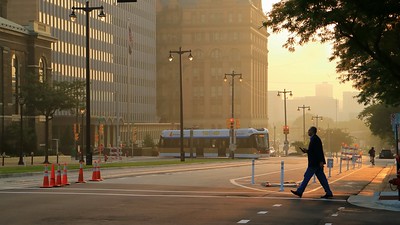 MKE Streetcar: Personal Blog
MKE Streetcar: Personal Blog

Caveats about my Streetcar Blog
by John December / Updates/More Info: johndecember.com/mke
- I acknowledge that it is a privilege to be able to use a modern streetcar, and I know that many people do not have this access. My advocacy for extending the streetcar is precisely for this reason: long-standing inequities need to be addressed to provide access to high-quality transit for wider communities. Those who are underserved by present transit, those who don't drive, or those who would like to benefit from rail transit should have it available as a choice. I acknowledge that there are concerns about displacement and rising property values that occur along high-quality transit routes. Anti-displacement planning should be a focus, so that a neighborhood-centric transit system develops that truly serves--not severs--a community.
- My choice of going by foot and streetcar isn't for everyone, and I'm not trying to turn everyone into car-free walkers. I simply want to point out that there is an option to live in a way that is more eco-friendly, community-supporting, simpler, and an excellent choice that fits into the long-standing function of cities to provide a range of transit infrastructure.
- I am hardly alone in being car-free, as the US Census found that 8.5% of US households have no vehicle available. In my zip code, 53202, 25% of households have no vehicle available.
- My study of streetcars isn't meant to imply other transit modes are unnecessary. My life experience has led me to see that no one mode or approach usually addresses a situation completely, but a mix of responses is often effective. So in no way is my writing here advocating for anything but a mix of transit modes--walking, planes, trains, automobiles, streetcars, buses, boats, bicycles, ebikes, scooters, motorcycles, wheelchairs, walkers, assistive devices, and others. I'm observing the benefits of streetcars, but I'm not looking for the solution of every transit situation to be a streetcar, but see the specific role and advantages of streetcars in specific areas of urban transit.
- I understand that research is inconclusive in some areas of streetcars while opinions seem to be abundant. A holistic approach looking at history, urban geography, transit research, the experience of people, and the needs and goals of a community is necessary for planning transit. Ideological opposition to any form of transit, particularly streetcars, can be very strong for many reasons. However, this should not obscure the actual lived experience of people, knowledge of operations, and the research results gained in urban environments throughout the world.
- I understand that all too frequently transportation budgets are held to a zero-sum game, but I don't seek to push out other modes of transit, including buses. My comparisons of the streetcar and bus are based on using both extensively. For example, I created a photo collage of a day on which I took 7 rides on the Hop streetcar and 6 rides on MCTS buses: My Intermodal Day. I had many days like this prior to the pandemic. My comparisons are in no way intended to disparage the bus service. We are fortunate to have a very good bus system, and I believe it can be better by working well in conjunction with other transit systems. I see an opportunity with streetcars to build high-quality public transit infrastructure that fulfills a unique role in urban transportation.
- During the 2020-2022 global pandemic, I suspended my use of The Hop for a period of time until masking and social distancing protocols were in place. I used masking and social distancing consistently while riding, and I reduced my riding.
- I have been car-free since 1989, have used transit around the world, and have been reading about urbanism for decades. This has influenced my evaluation of public transit. I used public transportation in Milwaukee during 1989-91, lived in upstate New York during 1991-1997, and I moved back to Milwaukee in 1998. I used mass transit in New York, London, Mexico City, Paris, Tokyo, Hong Kong, Macau, Beijing, Stockholm, Vienna, Chicago, Philadelphia, Milwaukee, Seattle, Minneapolis, San Francisco, San Jose, Toronto, Montreal, Boston, Washington DC, Detroit, Atlanta, Baltimore, New York State's Capital District, St. Louis, Wichita KS, Honolulu HI, Madison WI, Kenosha WI, Racine WI, Waukesha WI, and Michigan's Upper Peninsula.


